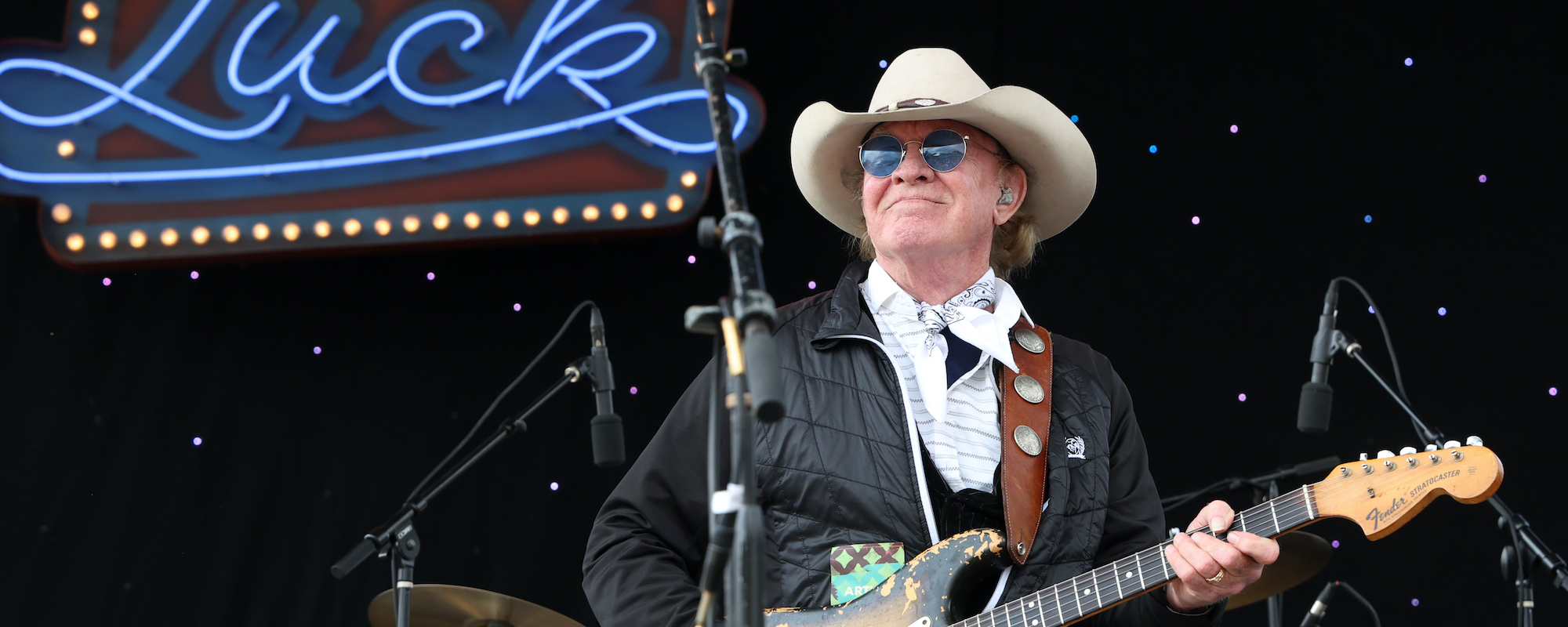The rhythm of the original version of “Folsom Prison Blues” by Johnny Cash chugs along just as the train he sings about. Luther Perkins delivers the unmistakable guitar lick that kicks it off. Marshall Grant’s upright bass and Cash’s acoustic guitar work together to create the rockin’ rumble of a steam engine comin’ round the bend. And Sam Phillips captured the chaos perfectly in the little recording studio at 706 Union Avenue in Memphis, Tennessee. But let’s also explore the meaning behind “Folsom Prison Blues” by Johnny Cash.
Videos by American Songwriter
It was July 1955, and Elvis Presley was making big waves in the Southeast. He had released four singles on the Sun Records label owned by Phillips. The song was Cash’s first top-ten country hit and had a strange and unlikely origin. It would also go on to have a much more successful second life more than a decade later.
I hear the train a-comin’
It’s rollin’ ’round the bend
And I ain’t seen the sunshine
Since I don’t know when
I’m stuck in Folsom Prison
And time keeps draggin’ on
But that train keeps a-rollin’
On down to San Antone
Inspired by a Movie
Cash enlisted in the U.S. Air Force in 1950 and was sent to San Antonio, Texas, for basic training. He was then shipped out to Landsberg, West Germany, where he spent three years as a radio interceptor. Shortly after he arrived, he went to a movie theater to catch a show. Inside the Walls of Folsom Prison was a gritty, low-budget Warner Brothers drama that focused on the harsh conditions of the inmates, especially before the 1944 California prison reform. Cash related to the captives, as he felt somewhat imprisoned himself half a world away from his home. He started toying with song ideas about being a prisoner. He kept a notebook and would jot down poems and song ideas. Cash liked to write spin-offs of popular songs or parodies of the hits.
…And a Song
As Cash walked through the barracks, a song caught his attention. Chuck Riley had purchased an album from the PX called Seven Dreams by composer-arranger Gordon Jenkins, who worked with such pop stars as Nat “King” Cole, Frank Sinatra, and The Andrews Sisters. Beverly Mahr sang “Crescent City Blues” as part of the concept album, and Cash became fixated on it. The lyrics are very familiar. Here’s the second verse of the Jenkins song…
When I was just a baby
My Mama told me, Sue
When you’re grown up
I want that you should go and see and do
But I’m stuck in Crescent City
Just watching life mosey by
When I hear that whistle blowin’
I hang my head and cry.
And the Lyrics Cash Wrote…
When I was just a baby
My Mama told me, Son
Always be a good boy
Don’t ever play with guns
But I shot a man in Reno
Just to watch him die
When I hear that whistle blowin’
I hang my head and cry
[RELATED: 10 Iconic Moments From Johnny Cash’s Career]
The Parallels
Cash wanted to write a song about the loneliness of the inmates in Folsom Prison but couldn’t come up with anything. This song by Gordon Jenkins framed it all perfectly. The loneliness of a train whistle to a man who’s locked up is intensified. The idea of shooting a man just to watch him die is cold, indeed. Cash wanted the song to be from the perspective of a prisoner with nothing. The concept of killing only for the sake of killing frames it just that way. The fact he shot a man in Reno and is apparently serving time in Folsom has not been explained, but it certainly didn’t hurt the song’s popularity.
Nearly all of the lyrics are paralleled in the Jenkins version.
I bet there’s rich folks eatin’
In a fancy dining car
They’re probably drinkin’ coffee
And smokin’ big cigars
But I know I had it comin’
I know I can’t be free
But those people keep a-movin’
And that’s what tortures me
The Second Life
Cash returned to the States in 1954, married, and moved to Memphis to start a family. His brother was working as an automobile mechanic on Union Avenue, and it was there that Cash met Perkins and Grant, who would rehearse in the break room. They started a band, auditioned for Phillips, and impressed him enough to release a record, “Cry, Cry, Cry” backed with “Hey, Porter.” “Folsom Prison Blues” would follow. His career really kicked into gear with his third release, “I Walk the Line.” The demanding life on the road led to drug and alcohol abuse, which nearly ended the singer’s will to live. In 1968, he recorded a live album in Folsom Prison. The lead single was the re-recording of the song bearing the institution’s name, and this time, it soared to the top spot of the Billboard Hot 100.
With the newfound success of “Folsom Prison Blues,” Gordon Jenkins brought a lawsuit against Cash. The composer had never been credited on either release of the song. Cash paid a settlement of approximately $75,000 to amend the wrongdoing. Nothing was ever mentioned in court about the 1930s instrumental “Crescent City Blues” by Little Brother Montgomery, which has a similar melody to the one used by Jenkins.
Well, if they freed me from this prison
If that railroad train was mine
I bet I’d move out over a little
Farther down the line
Far from Folsom Prison
That’s where I want to stay
And I’d let that lonesome whistle
Blow my Blues away
Producer Bob Johnston provided a critical element before the prison taping. Cash wasn’t sure what to say as he prepared to face the inmates. Johnston told him just to tell them who he was and go into the song. The “man in black” began the show with, “Hello, I’m Johnny Cash,” which became his catchphrase.
Photo by Michael Ochs Archives/Getty Images













Leave a Reply
Only members can comment. Become a member. Already a member? Log in.